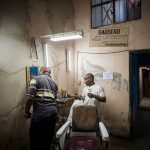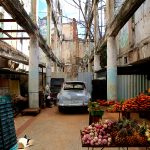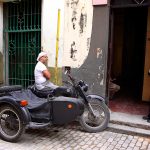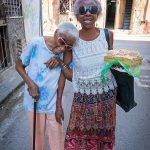Conrad Gees
Los Habaneros
There is truth in the statement, Havana is a city frozen in time sixty plus years ago. This is clearly evident in the American cars from the 1950’s still traveling the streets, and in many of the storefronts with their limited consumer goods, but it is also a characterization, which can lead one to a false sense of sentimentality or condescension.
The 1961 US embargo did, in one sense, freeze Havana and cut it off from consumer goods progress, and severely limited its economic development, but the Havana of today is not the Havana of 1961. Havana today is the outgrowth of the 1959 Revolution, the US embargo and the Cold War which forced the inhabitants of this city, just 90 miles off the US coast to develop in ways they can speak of with great pride and in ways which leave them longing for more.
In 2015 I traveled through Mexico to Havana for the first time. Although restrictions on travel from the US to Cuba had just been eased, I was one of very few Americans on the streets of Havana not tied to a tour. The excitement and openness expressed to me by the Habaneros was infectious and led to my returning three additional times.
While concentrating on the sections of Havana known as “Habana Vieja,” and “Centro Habana”, now United Nations World Heritage Sites being renovated and brought back to life, I decided to document not only the buildings but the people living in these currently run-down sections of the city. Their homes, the means by which they get food, their jobs, and even the newly sanctioned small private enterprise ventures, left me, an American with many privileges in life, awed and humbled by the resilience and ingenuity of the Habaneros.
The images in this body of work grew out of, and helped me to develop, a deeper understanding of Havana and its people. Havana is truly a city of resilience.
Artist Bio
Conrad Gees is a photographer based in Natick, MA. His lifelong interest in photography stems from a love of images that speak to the viewer on multiple levels. Conrad has taken this ethos to the forests of Eastern MA, the railways of Europe, and most recently, the streets of Havana where he has embarked upon of a multi-year project documenting the impact of the renewed relations between the US and Cuba.
Gees’ work has been exhibited in solo shows at Griffin Museum SoWa Gallery, The New England School of Photography, The Center for the Arts Natick, and Baldwin Hill Art and Framing Gallery, as well as group shows at The Griffin Museum of Photography, the Providence Center for Photographic Arts, Photo Place Gallery in Vermont, and the University of Massachusetts Amherst, and Smith College. His work has also been published in: Don’t Take Pictures and the University of Massachusetts Amherst’s Fine Arts Magazine. Most recently he completed the Photography Atelier Program at the Griffin Museum of Photography under the tutelage of Meg Birnbaum and Amy Rindskopf and has had his Bosque Magico de la Habana Portfolio accepted as one of the top 200 finalists for Photo Lucida’s Critical Mass 2017 .
“I look at the world around me and try to capture those moments when the visual world leads to an image which speaks to more than the subject at hand, much as a poem can convey meaning far beyond a literal interpretation: When looking becomes seeing.” CG
http://conradgeeswhatnowphotography.com
Contact Conrad Gees









